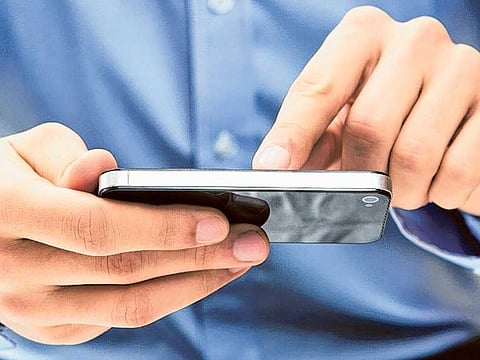Going abroad? Be careful about what’s on your phone
Even innocent content on smartphones could result in being denied entry

Dubai: If you plan to travel to abroad soon, be careful what’s on your smartphone or tablet.
In the last three months, 60 students from Saudi Arabia learnt this the hard way when their visas were cancelled on arrival in US airports. Authorities had found suspect content on their mobile devices, Gulf News reported earlier.
With their cultural background and heavy smartphone use, students from Gulf countries could be some of the most likely targets to be pulled aside by border agents. Around 120,000 Saudis are studying on government scholarships in the US and around 2,900 Emirati students study there, according to US figures.
While most people are aware of the risks of having pornographic or violent content on their phones — whether at home or abroad — even religious content could be misinterpreted by airport security agents, Saudi authorities say.
The news comes two weeks after Kuwait’s government advised citizens to make sure their phones contain no material that might be seen as being linked to Islamist militants before travelling to the United States.
This is “so that students and citizens may be spared questioning by authorities in US airports and to avoid any action against them that could result in cancelling their visas and banning them from entering US territories”. said the statement, reported by state news agency KUNA.
In July, three Kuwaiti businessmen were questioned for 21 hours at Los Angeles airport and had their mobile phones inspected before they were denied entry to the US, according to local media.
Tough rules
And it’s not just in the United States where travellers should be careful. In the UK, border police have been authorised to confiscate mobile phones and download the data since at least 2013.
In Australia, similar rules allow border officials to seize and examine computers and mobile phones at entry points.
With strict laws governing social media and content online, residents and citizens need to be better informed when they travel, said Tena Conil, a spokesman for Emirates Safer internet Society.
“Take what is standard practice locally and apply it abroad as well,” he said. The non-profit organisation tours schools and holds workshops to raise awareness about internet safety and risks of becoming radicalised from online sources.
The society advises people to be mindful of what it calls the ‘Three Cs’ — inappropriate Content, inappropriate Contact, and inappropriate Conduct.
To combat the issue of border officials taking a dim view of religious content on people’s phones, international bodies, including the United Nations, should talk to member states about respecting freedom of religion, said the spokesman.
“Maybe there is room for dialogue in that area,” the spokesman said. But in the meantime, taking personal responsibility for content stored on devices — especially while travelling — is key.
“What is on your phone and your personal devices is always your responsibility,” said Conil.
Smartphone users also need to be wary that even content sent to them without being requested — such as pictures on a WhatsApp group — could land the user in trouble.
“What comes into your phone, say your smartphone or iPad, if it’s inappropriate content, must be deleted. You are liable to be prosecuted on that basis. It’s a personal liability because it’s a personal device.”
On the safe side
The risk of having his phone searched by Customs officials doesn’t deter Ahmad Bin Al Shaikh, an Emirati who lives in Sharjah.
“Due to the current situation in the world, the faith is at risk of being misinterpreted both by Muslim extremists and Islamophobic authorities,” said Al Shaikh, in reference to the risk of having religious content on his devices.
Like many of his countrymen, Al Shaikh regularly travels on foreign holidays to the US and UK.
“But to be on the safe side, I would remove Islamic-looking material when travelling,” he added.
Staying safe
Q: I’m travelling and there’s risky content on my device. What do I do?
A: For phones or tablets, there are plenty of free applications that can be installed to wipe out unwanted files and folders.
Using specialised tools — instead of just normally deleting items through the operating system’s interface ensures that they are gone for good, according to Ali Al Amadi, managing director of Dubai-based consultancy Ebdaa.
While Al Amadi prefers not to single out particular wiping apps, a quick search on the Google Play store for Android devices shows multiple wiping apps. One, called Secure Wipe, has been downloaded over 100,000 times and promises to “sanitise” the trail left by deleted files.
If you wish to completely wipe out all files, most new Anroid and Apple devices have a built-in option to perform a factory reset — and erase everything at the press of a button.
Sign up for the Daily Briefing
Get the latest news and updates straight to your inbox



